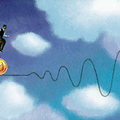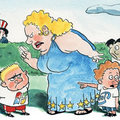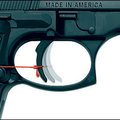The president closes a critical TV station
| |
 | |
IN THE ultra-modern, digital newsroom of Radio Caracas Televisión (RCTV), a message taped to a room-divider reads: “If you’re looking to buy consciences, ours are not for sale”. RCTV’s journalists are unable to broadcast their news programmes in the normal fashion since the channel was taken off the air just before midnight on Sunday May 27th. President Hugo Chávez decreed last December that there would be no more television concessions for what he calls “fascists” and “coup plotters”. His supporters argue that the concession expired on Sunday and was simply not renewed. The channel’s owners and staff, along with many human-rights organisations, see the move as revenge for their critical editorial line.
Channel 2, where RCTV had broadcast for more than half a century, is now home to a new government-run channel. Gone are Venezuelans’ favourite soap operas, the world’s longest-running comedy show, “Radio Rochela”, and a breakfast talk-show called “The Interview” that has earned its outspoken anti-Chávez host, Miguel Angel Rodríguez, a stream of insults and threats from sources supporting the president. Polls suggest that an overwhelming majority of Venezuelans oppose what they consider as interference with their choice of viewing.
On Sunday and Monday many took to the streets, and to the airwaves—or at least, those that are still open to dissenting voices. That means, primarily, Globovisión: the 24-hour news station is the only remaining anti-government channel. Students from Caracas’s main universities, and others across the country, braved tear-gas and plastic bullets from riot police. They were joined by journalists and, in a remarkable show of solidarity, by soap stars and news anchors from RCTV’s rival, Venevisión. Its boss, Gustavo Cisneros, caved in to government pressure several years ago and removed anti-Chávez commentary and news items from his station.
Mr Chávez won re-election last December, after nearly eight years in power, with more than 60% of the vote. Since then, he has taken a sharp turn to the left, in a bid to install in Venezuela what he calls a “21st century socialist” regime. But many of his own supporters oppose the closure of RCTV. The second-largest party in his parliamentary coalition, the social-democratic Podemos, refused to attend a recent session in support of the decision. Party sources say that not one of its legislators agrees with the closure of RCTV. International reaction has scarcely been more encouraging for Mr Chávez.
On Monday the European Union expressed concern that the non-renewal of the concession took place without any open competition for a successor. Germany called on the Venezuelan government to respect the principle of press freedom. Non-governmental organisations such as Human Rights Watch, Reporters Without Borders and the Committee to Protect Journalists have all condemned the move. Carlos Lauría of the CPJ called it “a predetermined and politically motivated effort to silence critical coverage [which] sets a chilling precedent.”
RCTV, along with Venezuela’s other TV channels, are not without blemish. In April 2002, when Mr Chávez was briefly ousted in a coup attempt, they blacked out news of protests that helped to restore him to power. And their role as behind-the-scenes power brokers has often distorted their coverage. But the government’s growing number of media outlets, both broadcast and print, pump out an unremitting diet of pro-Chávez propaganda, belittling and even slandering opposition figures on a daily basis. Moreover, the government holds all the regulatory powers, as well as controlling the Supreme Court, whose rulings seldom challenge its interests.
Has Mr Chávez made a significant miscalculation, which could affect his apparently firm grip on power? Enrique ter Horst, a lawyer and a former UN deputy high commissioner for human rights, says Mr Chávez remains strong but that, “he clearly overestimated his forces in this case”. The circumstances “open a new chapter” in the country’s political crisis.
Mr Chávez seems to have two options: a further crack-down on dissent, or to ease up on the revolutionary accelerator. A legal move on Monday to prosecute Globovisión for allegedly hinting that the president should be assassinated, by Venezuela’s information minister suggests that the government does not plan to climb-down. If so, tension is sure to rise.





